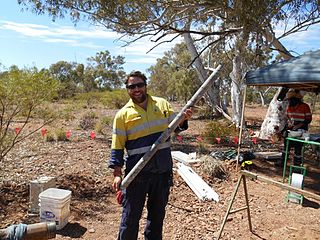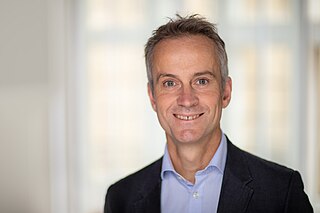
Civil engineering is a professional engineering discipline that deals with the design, construction, and maintenance of the physical and naturally built environment, including public works such as roads, bridges, canals, dams, airports, sewerage systems, pipelines, structural components of buildings, and railways.
The following outline is provided as an overview of and topical guide to engineering:
Geo- is a prefix derived from the Greek word γη or γαια, meaning "earth", usually in the sense of "ground or land”.
A Bachelor of Engineering is a first professional undergraduate academic degree awarded to a student after three to five years of studying engineering at an accredited university. In the UK, a B.Eng. degree will be accredited by one of the Engineering Council's professional engineering institutions as suitable for registration as an incorporated engineer or chartered engineer with further study to masters level. In Canada, the degree from a Canadian university can be accredited by the Canadian Engineering Accreditation Board (CEAB). Alternatively, it might be accredited directly by another professional engineering institution, such as the US-based Institute of Electrical and Electronics Engineers (IEEE). The B.Eng. contributes to the route to chartered engineer (UK), registered engineer or licensed professional engineer and has been approved by representatives of the profession.

Bedrock in geology is lithified rock that lies under loose softer material called regolith within the surface of the Earth's crust or other terrestrial planets.

Engineering geology is the application of geology to engineering study for the purpose of assuring that the geological factors regarding the location, design, construction, operation and maintenance of engineering works are recognized and accounted for. Engineering geologists provide geological and geotechnical recommendations, analysis, and design associated with human development and various types of structures. The realm of the engineering geologist is essentially in the area of earth-structure interactions, or investigation of how the earth or earth processes impact human made structures and human activities.
Planetary engineering is the application of technology for the purpose of influencing the global environments of a planet. Its objectives usually involve increasing the habitability of other worlds or mitigating decreases in habitability to Earth.
Climate engineering or climate intervention, commonly referred to as geoengineering, is the deliberate and large-scale intervention in the Earth's climate system to counteract climate change. The most prominent subcategories of climate engineering are solar radiation management and carbon dioxide removal. Solar radiation management refers to offsetting the warming effect of greenhouse gases by reflecting more solar radiation (sunlight) back into space. Carbon dioxide removal refers to removing carbon dioxide gas from the atmosphere and sequestering it for long periods of time.
This is a list of climate change topics.

Professor Gideon Mark Henderson FRS is a British geochemist whose work focuses on low temperature geochemistry, the carbon cycle, the oceans, and on understanding the mechanisms driving climate change. Henderson was the Head of Department at the Department of Earth Sciences at the University of Oxford, and is presently the Chief Scientific Advisor at the UK Department for Environment, Food, and Rural Affairs.

Solar radiation management (SRM), or solar geoengineering, is a type of climate engineering in which sunlight is reflected back to space to limit or reverse global warming. Proposed methods include increasing the planetary albedo (reflectivity), for example with stratospheric sulfate aerosol injection. Localized protective or restorative methods have also been proposed regarding the protection of natural heat reflectors including sea ice, snow, and glaciers. Their principal advantages as an approach to climate engineering is the speed with which they can be deployed and become fully active, their low financial cost, and the reversibility of their direct climatic effects.

A geologist is a scientist who studies the solid, liquid, and gaseous matter that constitutes the Earth and other terrestrial planets, as well as the processes that shape them. Geologists usually study geology, although backgrounds in physics, chemistry, biology, and other sciences are also useful. Field work is an important component of geology, although many subdisciplines incorporate laboratory work.

The ability of stratospheric aerosols to create a global dimming effect has made them a possible candidate for use in solar radiation management climate engineering projects to limit the effect and impact of climate change due to rising levels of greenhouse gases. Delivery of precursor sulfide gases such as sulfuric acid, hydrogen sulfide or sulfur dioxide by artillery, aircraft and balloons has been proposed. Non-sulfide substances such as calcite have also been proposed given their benefits to the ozone layer. It appears that this could counter most changes to temperature and precipitation, take effect rapidly, have low direct implementation costs, and be reversible in its direct climatic effects. However, it would do so imperfectly and other effects are possible.
David W. Keith is Gordon McKay Professor of Applied Physics for Harvard University's Paulson School of Engineering and Applied Sciences (SEAS) and Professor of Public Policy for the Harvard Kennedy School at Harvard University. He is also board member and acting chief scientist at Carbon Engineering.

Whole Earth Discipline: An Ecopragmatist Manifesto is the sixth book by Stewart Brand, published by Viking Penguin in 2009. He sees Earth and people propelled by three transformations: climate change, urbanization and biotechnology. Brand tackles "touchy issues" like nuclear power, genetic engineering and geoengineering, "fully aware that many of the environmentalist readers he hopes to reach will start out disagreeing with him".
Space mirrors are man-made satellites that are designed to change the amount of solar radiation that impacts the Earth as a form of climate engineering. Since the conception of the idea in the 1980s, space mirrors have mainly been theorized as a way to deflect sunlight to counter global warming and was seriously considered in the 2000s.
Geoprofessions is a term coined by the Geoprofessional Business Association to connote various technical disciplines that involve engineering, earth and environmental services applied to below-ground (“subsurface”), ground-surface, and ground-surface-connected conditions, structures, or formations. The principal disciplines include, as major categories:

Stratospheric Particle Injection for Climate Engineering was a United Kingdom government-funded climate engineering (geoengineering) research project that aimed to assess the feasibility of injecting particles into the stratosphere from a tethered balloon for the purposes of solar radiation management.
Novim is a non-profit group at the University of California, Santa Barbara that organizes teams for objective scientific study of global issues and identification options for addressing the concerns, based upon an collaborative problem-solving approach used in the field of physics.
ETC Group is an international organization dedicated to "the conservation and sustainable advancement of cultural and ecological diversity and human rights." The full legal name is Action Group on Erosion, Technology and Concentration. "ETC" is intended to be pronounced "et cetera." The ETC Group often publishes opinions on scientific research; its staff and board members come from a variety of backgrounds, including community and regional planning, ecology and evolutionary biology, and political science.






